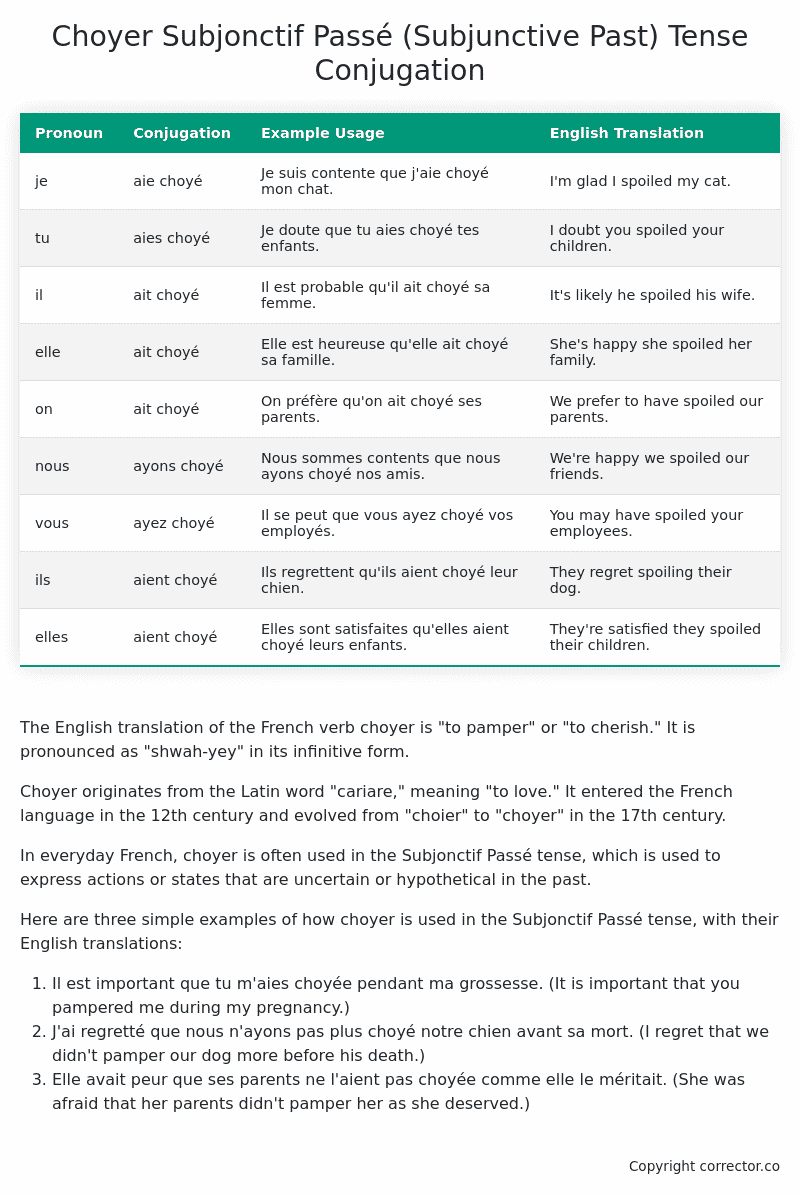Subjonctif Passé (Subjunctive Past) Tense Conjugation of the French Verb choyer
Introduction to the verb choyer
The English translation of the French verb choyer is “to pamper” or “to cherish.” It is pronounced as “shwah-yey” in its infinitive form.
Choyer originates from the Latin word “cariare,” meaning “to love.” It entered the French language in the 12th century and evolved from “choier” to “choyer” in the 17th century.
In everyday French, choyer is often used in the Subjonctif Passé tense, which is used to express actions or states that are uncertain or hypothetical in the past.
Here are three simple examples of how choyer is used in the Subjonctif Passé tense, with their English translations:
- Il est important que tu m’aies choyée pendant ma grossesse. (It is important that you pampered me during my pregnancy.)
- J’ai regretté que nous n’ayons pas plus choyé notre chien avant sa mort. (I regret that we didn’t pamper our dog more before his death.)
- Elle avait peur que ses parents ne l’aient pas choyée comme elle le méritait. (She was afraid that her parents didn’t pamper her as she deserved.)
Table of the Subjonctif Passé (Subjunctive Past) Tense Conjugation of choyer
| Pronoun | Conjugation | Example Usage | English Translation |
|---|---|---|---|
| je | aie choyé | Je suis contente que j’aie choyé mon chat. | I’m glad I spoiled my cat. |
| tu | aies choyé | Je doute que tu aies choyé tes enfants. | I doubt you spoiled your children. |
| il | ait choyé | Il est probable qu’il ait choyé sa femme. | It’s likely he spoiled his wife. |
| elle | ait choyé | Elle est heureuse qu’elle ait choyé sa famille. | She’s happy she spoiled her family. |
| on | ait choyé | On préfère qu’on ait choyé ses parents. | We prefer to have spoiled our parents. |
| nous | ayons choyé | Nous sommes contents que nous ayons choyé nos amis. | We’re happy we spoiled our friends. |
| vous | ayez choyé | Il se peut que vous ayez choyé vos employés. | You may have spoiled your employees. |
| ils | aient choyé | Ils regrettent qu’ils aient choyé leur chien. | They regret spoiling their dog. |
| elles | aient choyé | Elles sont satisfaites qu’elles aient choyé leurs enfants. | They’re satisfied they spoiled their children. |
Other Conjugations for Choyer.
Le Present (Present Tense) Conjugation of the French Verb choyer
Imparfait (Imperfect) Tense Conjugation of the French Verb choyer
Passé Simple (Simple Past) Tense Conjugation of the French Verb choyer
Passé Composé (Present Perfect) Tense Conjugation of the French Verb choyer
Futur Simple (Simple Future) Tense Conjugation of the French Verb choyer
Futur Proche (Near Future) Tense Conjugation of the French Verb choyer
Plus-que-parfait (Pluperfect) Tense Conjugation of the French Verb choyer
Passé Antérieur (Past Anterior) Tense Conjugation of the French Verb choyer
Futur Antérieur (Future Anterior) Tense Conjugation of the French Verb choyer
Subjonctif Présent (Subjunctive Present) Tense Conjugation of the French Verb choyer
Subjonctif Passé (Subjunctive Past) Tense Conjugation of the French Verb choyer (this article)
Subjonctif Imparfait (Subjunctive Imperfect) Tense Conjugation of the French Verb choyer
Subjonctif Plus-que-parfait (Subjunctive Pluperfect) Tense Conjugation of the French Verb choyer
Conditionnel Présent (Conditional Present) Tense Conjugation of the French Verb choyer
Conditionnel Passé (Conditional Past) Tense Conjugation of the French Verb choyer
L’impératif Présent (Imperative Present) Tense Conjugation of the French Verb choyer
L’infinitif Présent (Infinitive Present) Tense Conjugation of the French Verb choyer
Struggling with French verbs or the language in general? Why not use our free French Grammar Checker – no registration required!
Get a FREE Download Study Sheet of this Conjugation 🔥
Simply right click the image below, click “save image” and get your free reference for the choyer Subjonctif Passé tense conjugation!

Choyer – About the French Subjonctif Passé (Subjunctive Past) Tense
Formation of the Subjonctif Passé
Everyday Usage Patterns
Interactions with Other Tenses
Present tense
Future tense
Conditional
Summary
I hope you enjoyed this article on the verb choyer. Still in a learning mood? Check out another TOTALLY random French verb conjugation!


